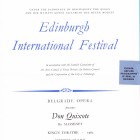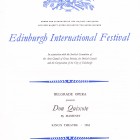Don Quichotte 1962Belgrade Opera
Read more about the opera Don Quichotte
As part of the Edinburgh International Festival, the company from Belgrade were imported to fill a gap in the repertoire - Russian opera had hitherto been ignored, and the Yugoslavs provided the closest to an authentic slavonic sound that we were likely to hear, even if some of the singers had a tendency to perform in Serbo-Croat. The other opera at the Festival was presented by the English Opera Group - a new staging of Britten’s tense little masterpiece, The Turn of the Screw, with two of the creators in the cast.
The repertoire the Yugoslavs brought was wonderfully unusual and enterprising. The Russian rarities were Musorgsky's Khovanshchina, Borodin's Prince Igor and Prokofiev's Gambler and Love for Three Oranges, both receiving British premieres. The non-Russian rarity was Massenet's Don Quichotte.
Massenet's operas were very unfashionable in the decades after the war, and the most widely admired of them, Manon, had almost disappeared from the repertoire. Even Werther, nowadays restored to popularity, was never heard in Britain in those days. In Belgrade, however, Don Quichotte was revived as a vehicle for the leading Serbian bass, and was toured for several years. It was a very welcome choice to bring to the 1962 Festival, even translated into Serbo-Croat.
Performance Cast
- Dulcinée
- Don Quichotte a knight
- Sancho Pança Quichotte's servant
- Pedro a burlesquer, and admirer of Dulcinée
- Garcias a burlesquer, and admirer of Dulcinée
- Rodriguez an admirer of Dulcinée
- Juan an admirer of Dulcinée
- Fool

